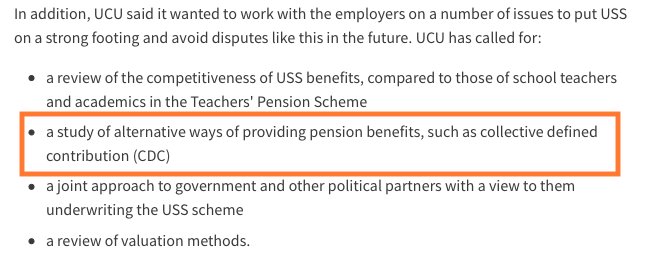Back to the complex links between gov policy, consultants, pension plans -- & the making of worlds & futures.
Or: where my trawl through parliamentary committees has taken me today & how it bears on current @ucu & @UniversitiesUK negotiations #ucustrikes #USSstrikes
Or: where my trawl through parliamentary committees has taken me today & how it bears on current @ucu & @UniversitiesUK negotiations #ucustrikes #USSstrikes
See @ucu's list of things it wants to work with employers on, particularly what is in the orange rectangle #USSstrikes #ucustrike ucu.org.uk/article/9364/F… 

Aon Hewitt -- the consultancy Universities UK has been working with since at least 2007 -- has been pushing CDCs (or 'defined aspiration'/'defined ambition') [wow, the language] in its engagements with government at least since 2012 publications.parliament.uk/pa/cm201213/cm… #USSstrikes #ucustrike
I am in no way any kind of expert on CDCs (I mean, I barely knew the difference btw DB & DC until the strike started [see: @CLIVEYB's poptheory.org/2018/03/07/the…]), but I think it's important that we bear in mind that Aon Hewitt is VERY MUCH into them #ucustrikes #ussstrikes
And my trawl through websites & docs in last few days really bring home how the futures of government and other policies (as well as norms, instruments, apparatuses) can be set in motion (again, see work by @AmooreLouise @harrietbulkeley)
Now -- & here is where I really need help of people who actually research this stuff & know about history of pensions policies in the UK -- my sense is that there is a lively debate in 2012 & into present about CDCs, i.e. there is heterogeneity in position #ucustrike #ussstrikes
For example, Mercer (one of the other 'top 3' consultancies in pensions field, seems much more lukewarm about CDCs in its 2012 submission parliament.uk/documents/Bind… 

There was a lot of discussion of the risks & benefits of CDCs amongst the witnesses (who included Martin Lowes for Aon Hewitt) for the 2014 Public Bill Committee publications.parliament.uk/pa/cm201415/cm… #ucustrike #USSstrikes
And here is Aon Hewitt's own 2013 doc "Making the Case for Collective DC" aon.com/unitedkingdom/… (Remember: Kevin Wesbroom appeared in front of the Parliamentary Committee) 

Implementation of CDC is announced in the Queen's Speech in the summer of 2014 bbc.co.uk/news/uk-276538…, and Aon Hewitt warmly welcomes this, unlike Mercer hub.ipe.com/news/uk-set-to… 

An inquiry into CDCs launches Nov 17. The landing page references studies by Aon Hewitt and the RSA that allege that 'CDC could have delivered 33% better pension outcomes than traditional DC over the past half-century'. parliament.uk/business/commi… #ucustrike #USSstrikes 

6 days ago (i.e. *this is all happening right now*) Work & Pensions Select Committee has apparently received 'mixed response' to its consultation. Aon has made a submission; Mercer hasn't ipe.com/pensions/count… 

Now @RosieCox007 has reminded me of all the work that @MikeOtsuka has done on DCD. See his submission here data.parliament.uk/writtenevidenc… & all the submissions here parliament.uk/business/commi…
I've attached @MikeOtsuka's summary about CDC at the top of his submission, and also his really interesting footnote 3 on the independent replication of the approach taken by Aon data.parliament.uk/writtenevidenc… 



Here is Aon's own written evidence (thanks for the link, @MikeOtsuka) in favour of CDC data.parliament.uk/writtenevidenc…. I've pulled out a particular passage 

To be very clear. My point is not to take a position on CDCs. I've been interested in following the intertwinement of Aon & Universities UK (inspired by @gailfdavies). And today I became interested in tracking where & how Aon pops up in parliamentary processes
Throughout I've been interested in how futures are set in motion, and ideas & values seeded. We know that UUK & Aon have been working together for years; Aon has been an important expert for gov pension policy; & UCU is proposing working w employers on CDCs #USSstrike #ucustrike
I have a very basic question, I suppose. Does anything that we now know from @MikeOtsuka's @frenchshaun's @ewanmcg's @gailfdavies' & my writings/tweets - put alongside the actions of UUK over last few days - give us pause in relation to where we want to head to in this dispute?
And in addition, I also am completely gripped by how UK university pensions are a kind of experimental laboratory. See @CLIVEYB poptheory.org/2018/03/07/the… 

Aon's also stages early champions of CDC as key to generating momentum. Might, will, & ought the UK university sector be central to this experiment & its bringing about of a new reality? What role might, will & ought Aon to play -- and where - here? 

• • •
Missing some Tweet in this thread? You can try to
force a refresh





